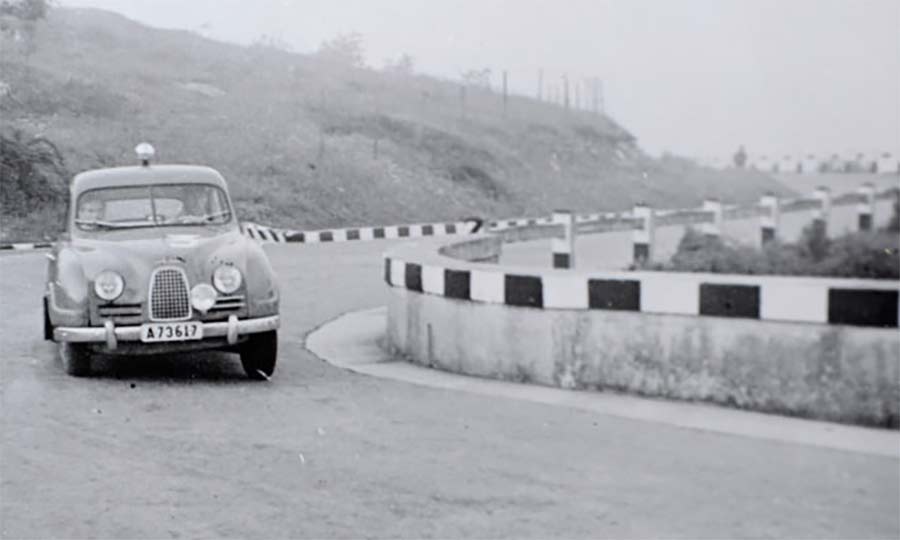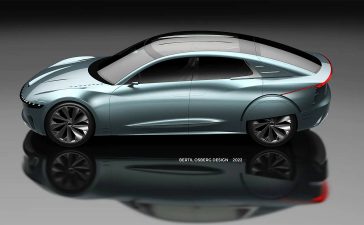The 1957 Mille Miglia remains etched in history as the final running of the original, competitive 1,000-mile race across the Italian countryside. While Ferrari dominated the race and tragedy struck, a quieter yet equally significant story unfolded. It was a tale of an unassuming Swedish car, the 1956 Saab 93A, driven by Charlie Lohmander and Harald Kronegård, that achieved an impressive class victory in the T750 category. This triumph proved that Saab’s engineering could stand tall even among the giants of the motorsport world.
Table of Contents
- 1 Saab’s Unexpected Entry into the Mille Miglia
- 2 The Tragic 1957 Race and the End of Competitive Mille Miglia
- 3 The Saab 93A: A Class Victory to Remember
- 4 A Surprising Win and Mille Miglia Eligibility
- 5 The 1957 Mille Miglia in Popular Culture
- 6 Saab’s Legacy in Motorsports
- 7 The Saab 93A’s Enduring Legacy
Saab’s Unexpected Entry into the Mille Miglia
The Mille Miglia was known for its grueling conditions and fierce competition. The 1957 race was no exception, with top teams like Ferrari and Maserati vying for supremacy with their high-powered machines. Ferrari’s 4.1-liter V12s and Maserati’s 4.5-liter V8s battled for the overall win, but amidst this, the Saab 93A, with its modest 748cc two-stroke engine, quietly made its mark.
What’s particularly intriguing is that Lohmander and Kronegård entered the race privately, without Saab’s factory even knowing about their participation. It was a bold move, given the intense nature of the race and the high-profile competitors. Despite flying under the radar, their effort paid off. The duo not only completed the race but won their class — a feat that only became known after they returned to Sweden. Saab’s leadership was reportedly surprised to learn about the victory, which turned into an unexpected triumph for the brand.
The Tragic 1957 Race and the End of Competitive Mille Miglia
The 1957 Mille Miglia is infamous for the tragic accident involving Alfonso de Portago’s Ferrari, which crashed at high speed, killing de Portago, his navigator Edmond Nelson, and nine spectators, including five children. This devastating accident led to the Italian government banning the Mille Miglia as a competitive event, marking the end of the legendary road race.
While the tragedy overshadowed much of the race, Saab’s victory in the T750 class was a reminder that motorsport is not just about raw power but also about precision, durability, and engineering. Competing against larger and more powerful cars, the Saab 93A, driven by Carl “Charlie” Lohmander and Harlad Kronegård, proved that it could navigate the treacherous 1,597 kilometers of public roads with both speed and reliability.
The Saab 93A: A Class Victory to Remember
The Saab 93A’s win in the T750 category wasn’t just a significant achievement for the brand — it was a testament to the car’s innovative design. Despite its small 748cc engine, the 93A’s aerodynamic body and lightweight construction helped it maintain a competitive pace throughout the race. Lohmander and Kronegård’s skill in handling the car, coupled with Saab’s commitment to engineering excellence, allowed the duo to outmaneuver their rivals in the tightly contested class.

The T750 class was known for its fierce competition, featuring cars from Fiat, Abarth, and other manufacturers. Yet, Saab’s unique approach — emphasizing efficiency, agility, and reliability — set the 93A apart. It wasn’t just a car built for speed; it was a car built for the long haul, designed to withstand the rigors of the Italian countryside while remaining fast and nimble.
A Surprising Win and Mille Miglia Eligibility
Lohmander and Kronegård’s class victory at the 1957 Mille Miglia wasn’t just a one-time success. It solidified the Saab 93A as a car eligible for the modern Mille Miglia, which now exists as a historic regularity rally. Only cars that participated in the original races can enter the event today, and thanks to this private entry, the Saab 93A remains part of this prestigious circle.
The 1957 Mille Miglia was a dangerous and demanding race, with drivers pushing their cars to the limit on open public roads. Today’s Mille Miglia is much safer, held as a historic event that celebrates the cars and the era, but it’s still a point of pride that the Saab 93A can take part. This eligibility adds to the 93A’s legacy as a car that not only survived one of the toughest races in history but also triumphed in its class.
The 1957 Mille Miglia in Popular Culture
The 1957 Mille Miglia has recently gained renewed attention, particularly through Michael Mann’s film Ferrari, which dramatizes the tragic events surrounding the race.

Although the film focuses on the battle between Ferrari and Maserati, the Saab 93A’s victory in the T750 class remains an essential part of the race’s history. While the Saab’s achievement wasn’t featured in the film, it’s a reminder that even in the shadows of more powerful machines, the little Swedish car managed to shine.
Saab’s Legacy in Motorsports
The Saab 93A’s triumph in the 1957 Mille Miglia is a defining moment in Saab’s motorsport history. It proved that Saab’s cars, known for their safety and efficiency, could compete against the world’s best on one of the most challenging stages in motorsport. The car’s victory in the T750 class not only brought recognition to Saab but also paved the way for the brand’s continued involvement in motorsport throughout the years.
Even though the Mille Miglia has transformed into a historic rally, the 1956 Saab 93A remains eligible to participate, a lasting testament to its role in one of the most prestigious races in history. The victory at the 1957 Mille Miglia is a reminder of Saab’s commitment to innovation and engineering excellence — qualities that defined the brand throughout its storied history.
The Saab 93A’s Enduring Legacy
The 1957 Mille Miglia marked the end of an era in motorsport, but it also marked a new chapter in Saab’s legacy. The 1956 Saab 93A, driven by Charlie Lohmander and Harald Kronegård, didn’t just compete in the race — it won its class, cementing its place in automotive history. This unexpected victory, achieved without the backing of the Saab factory, showed the world that even in the face of overwhelming competition, innovation and perseverance could lead to success.
As we look back on the final competitive Mille Miglia, the Saab 93A stands out as a symbol of what can be achieved with clever design and a bold spirit. It’s a story that continues to inspire automotive enthusiasts today, and it’s a victory that Saab fans can be proud of for generations to come.












2 stroke. Had one and loved it
TO Jay Miller>
it took a certain skill to drive it well and correctly, with the flywheel etc
Great car that’s why
The whole world were not smart enough to realise what a fabulous car all the saab models were particularly the 93 to 96 way ahead of anything out there but not to us saab people.long live saab.my 96 best car ever.had a saab in one form or another since 1972. Have three at the min 900 talladega. 93 aero. 93 vector..take that the rest of the world.should still be making them.
In the annals of motorsport history, the 1957 Mille Miglia stands as a testament to the indomitable spirit of competition and the power of innovation. Amidst the giants of the racing world, the Saab
93A, driven by Charlie Lohmander and Harald Kronegård, achieved a remarkable
class victory in the T750 category. This triumph, against all odds,
demonstrated that Saab’s engineering prowess could rival the most
powerful machines of the time.
Lohmander and Kronegård’s participation in the race
was a private initiative, unbeknownst to
Saab’s factory. Their daring entry underscored the determination and audacity
that characterized the team. Despite the challenges posed by the grueling conditions
and the formidable competition, they not only completed the race
but emerged victorious in their class. This accomplishment,
which only came to light after their return to Sweden, was a source of
immense pride for Saab and a testament to the brand’s engineering excellence.
The 1957 Mille Miglia, however, was marred by tragedy.
The accident involving Alfonso de Portago’s Ferrari claimed the lives of de Portago, his navigator
Edmond Nelson, and nine spectators, including five children. This devastating incident led
to the Italian government’s ban on the Mille Miglia as a competitive event,
marking the end of a legendary era in motorsport.
Amidst this tragedy, the Saab 93A’s class victory served as a beacon of hope and resilience.
It reminded the world that motorsport is not just about raw power but also about precision, durability, and engineering.
The 93A, with its modest 748cc two-stroke engine,
navigated the treacherous 1,597 kilometers of public roads with
speed and reliability, outmaneuvering larger
and more powerful cars in the process.
The Saab 93A’s victory in the T750 category was not a
one-off success. It solidified the car’s eligibility for the modern Mille Miglia, now held as a
historic regularity rally. Only cars that participated in the original races can
Here is my web site … sportblog (Tiffany)